-
 bitcoin
bitcoin $87959.907984 USD
1.34% -
 ethereum
ethereum $2920.497338 USD
3.04% -
 tether
tether $0.999775 USD
0.00% -
 xrp
xrp $2.237324 USD
8.12% -
 bnb
bnb $860.243768 USD
0.90% -
 solana
solana $138.089498 USD
5.43% -
 usd-coin
usd-coin $0.999807 USD
0.01% -
 tron
tron $0.272801 USD
-1.53% -
 dogecoin
dogecoin $0.150904 USD
2.96% -
 cardano
cardano $0.421635 USD
1.97% -
 hyperliquid
hyperliquid $32.152445 USD
2.23% -
 bitcoin-cash
bitcoin-cash $533.301069 USD
-1.94% -
 chainlink
chainlink $12.953417 USD
2.68% -
 unus-sed-leo
unus-sed-leo $9.535951 USD
0.73% -
 zcash
zcash $521.483386 USD
-2.87%
cheapest way to buy usdt
The cheapest USDT purchase method depends on fees (exchange, transaction, payment), with direct exchange buys often cheaper than P2P, but P2P offering more payment choices. Prioritize reputable, regulated exchanges to minimize risks and hidden costs.
Mar 21, 2025 at 03:21 pm
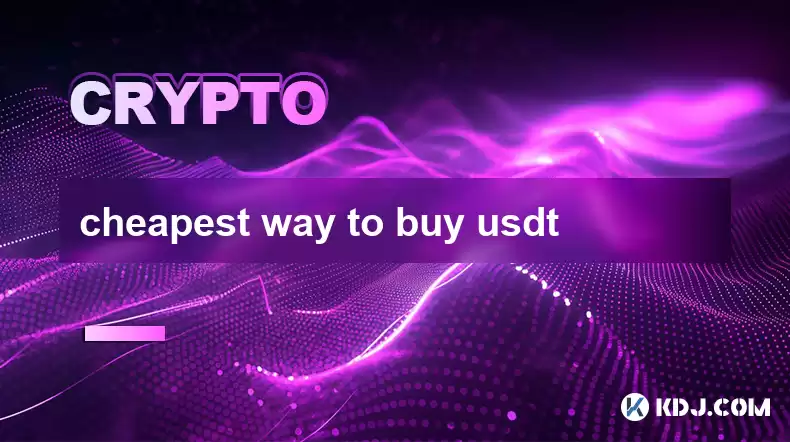
- Understanding USDT Acquisition Costs: The "cheapest" method depends on several factors, including transaction fees, exchange fees, and the payment method used.
- Direct Purchase vs. Peer-to-Peer: Direct purchase from exchanges usually involves lower fees than peer-to-peer (P2P) trading, but P2P offers more payment options.
- Minimizing Fees: Choosing exchanges with low trading fees and utilizing payment methods with minimal charges is crucial.
- Regulatory Considerations: Always ensure you use reputable and regulated exchanges to avoid scams and security risks.
- Stablecoin Volatility: While USDT aims for a 1:1 USD peg, minor fluctuations can impact your buying power.
Tether (USDT), a prominent stablecoin pegged to the US dollar, is frequently used in cryptocurrency trading. Finding the absolute cheapest way to acquire it involves navigating a landscape of fees and exchange choices. The optimal method depends on individual circumstances and priorities.
Exchanges and Their Fees: Many cryptocurrency exchanges offer USDT trading. Their fees vary considerably. Some charge flat fees per transaction, while others use a maker/taker fee structure based on the order type. Researching fees across several major exchanges – Binance, Coinbase, Kraken, etc. – is crucial before making a purchase. Compare their fees for your preferred payment methods (credit/debit cards, bank transfers, etc.).
Peer-to-Peer (P2P) Trading Platforms: P2P platforms connect buyers and sellers directly. This can offer flexibility in payment methods, potentially circumventing higher exchange fees. However, P2P carries inherent risks. Thoroughly vetting your trading partner to avoid scams is paramount. Always prioritize secure transactions and use escrow services if available.
Payment Method Impact: The method you use to fund your USDT purchase significantly affects the overall cost. Credit/debit card purchases are often convenient but usually come with higher fees than bank transfers. Bank transfers usually incur lower fees but may take longer to process. Some exchanges even offer lower fees for specific payment methods during promotional periods.
Minimizing Transaction Costs:- Choose the Right Exchange: Prioritize exchanges known for low fees and transparent pricing.
- Utilize Bank Transfers: If available, opt for bank transfers to minimize payment processing fees.
- Bulk Purchases: Buying larger quantities of USDT might lead to lower per-unit costs, but only if the exchange doesn't have excessively high flat fees.
- Timing Your Purchases: Be aware that exchange fees can fluctuate. Monitoring fee structures and buying when fees are lower can save money.
- Reputable Exchanges: Only use reputable and regulated cryptocurrency exchanges. Unregulated platforms are often associated with higher risks, including scams and security breaches.
- Security Practices: Always use strong passwords, enable two-factor authentication (2FA), and be wary of phishing attempts.
- KYC/AML Compliance: Know Your Customer (KYC) and Anti-Money Laundering (AML) regulations are in place to prevent illicit activities. Complying with these regulations is crucial for safe and legal USDT purchases.
USDT Volatility and Peg: While USDT is designed to maintain a 1:1 peg with the US dollar, minor fluctuations can occur. These variations, although usually small, can still impact the final cost of your USDT acquisition. Be aware that your actual purchase price might slightly deviate from the stated USD equivalent.
Understanding the nuances of different exchanges is key to finding the cheapest option. Remember to factor in all fees associated with your chosen method.Frequently Asked Questions:Q: Is buying USDT directly from an exchange always cheaper than P2P?A: Not always. While exchanges often have lower base fees, P2P platforms can sometimes offer better rates, especially if you can find sellers willing to accept your preferred payment method with minimal added fees. The total cost depends on the specific exchange and P2P seller.
Q: What are the risks associated with P2P USDT trading?A: P2P trading carries risks such as scams, fraud, and potential loss of funds if the seller is unreliable or the transaction isn't properly secured. Always use escrow services if available and carefully vet potential trading partners.
Q: Do all exchanges offer the same payment methods for buying USDT?A: No. Each exchange supports a different range of payment options. Some might only accept bank transfers, while others might offer credit/debit cards, PayPal, or other methods. The availability and associated fees will vary.
Q: How can I minimize the fees when buying USDT?A: Minimize fees by comparing fees across multiple exchanges, using bank transfers if available, considering bulk purchases (if economically beneficial), and timing your purchase to coincide with periods of lower exchange fees.
Q: Are there any hidden fees I should be aware of when buying USDT?A: Yes, be aware of network fees (gas fees on some blockchains), deposit fees, withdrawal fees, and potential conversion fees if you're using a payment method that isn't directly linked to your chosen exchange currency. Always carefully review the complete fee schedule before proceeding with a transaction.
Q: How does USDT's peg to the USD affect the cost of buying it?A: While USDT aims for a 1:1 peg with the USD, slight deviations can occur. These minor fluctuations can influence the final cost, though the impact is usually negligible unless significant market volatility affects the peg.
Q: What should I do if I encounter a problem during a USDT purchase?A: If you encounter issues, immediately contact the exchange's customer support or the P2P platform's dispute resolution system. Document all transactions and communication for potential recourse. If you suspect fraudulent activity, report it to the relevant authorities.
Disclaimer:info@kdj.com
The information provided is not trading advice. kdj.com does not assume any responsibility for any investments made based on the information provided in this article. Cryptocurrencies are highly volatile and it is highly recommended that you invest with caution after thorough research!
If you believe that the content used on this website infringes your copyright, please contact us immediately (info@kdj.com) and we will delete it promptly.
- Blockchains, Crypto Tokens, Launching: Enterprise Solutions & Real Utility Steal the Spotlight
- 2026-01-31 12:30:02
- Crypto Market Rollercoaster: Bitcoin Crash Recovers Slightly Amidst Altcoin Slump and Lingering Fear
- 2026-01-31 13:10:01
- Solana's Stumble and APEMARS' Rise: Crypto Investors Navigate Volatile Markets
- 2026-01-31 13:05:01
- Bitcoin Options Delta Skew Skyrockets, Signaling Intense Market Fear Amidst Volatility
- 2026-01-31 13:00:02
- Cardano Secures Tier-One Stablecoin: USDCX Arrives Amidst Global Regulatory Push
- 2026-01-31 13:00:02
- A Shining Tribute: Oneida Woman, Washington's Army, and the New $1 Coin
- 2026-01-31 12:55:01
Related knowledge
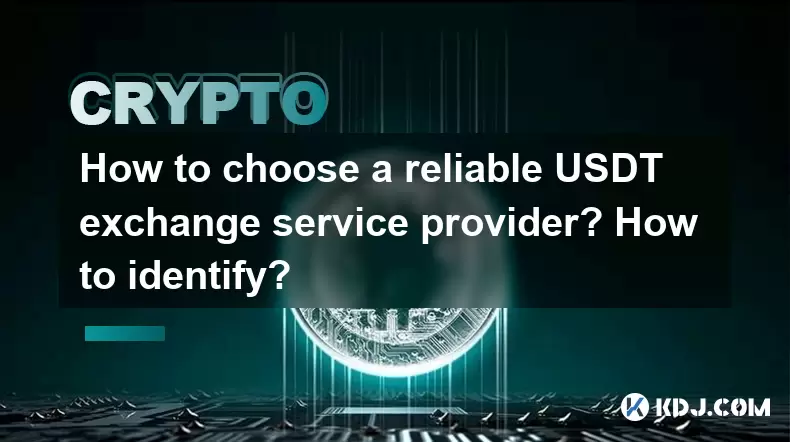
How to choose a reliable USDT exchange service provider? How to identify?
Jun 12,2025 at 03:15pm
Understanding the Role of USDT in Cryptocurrency TradingUSDT (Tether) is one of the most widely used stablecoins in the cryptocurrency market. It is d...
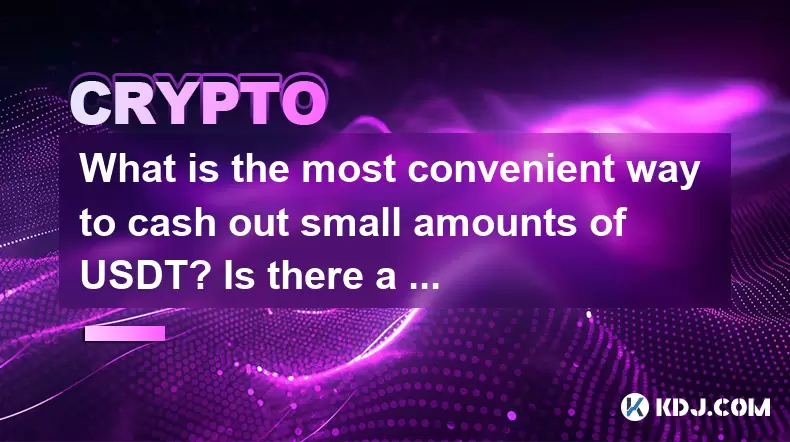
What is the most convenient way to cash out small amounts of USDT? Is there a shortcut?
Jun 11,2025 at 11:00pm
Understanding the Need to Cash Out Small USDT AmountsCashing out small amounts of USDT can be a challenge for many crypto users. Traditional methods o...
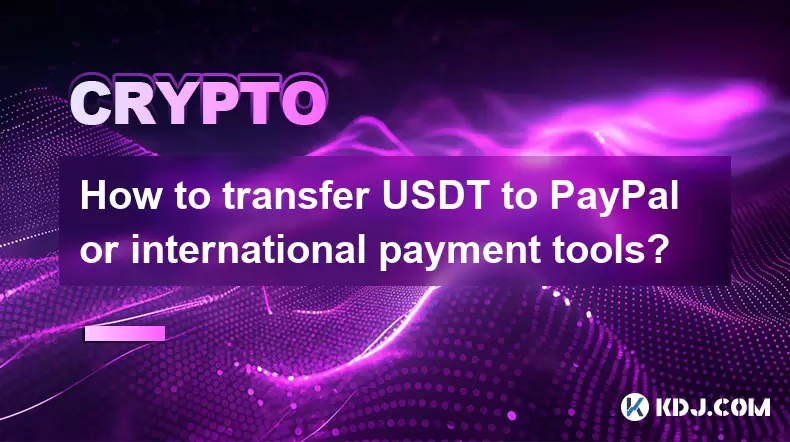
How to transfer USDT to PayPal or international payment tools?
Jun 15,2025 at 05:28am
Understanding the Basics of USDT and PayPal IntegrationUSDT (Tether) is a stablecoin pegged to the US dollar, offering blockchain-based value transfer...
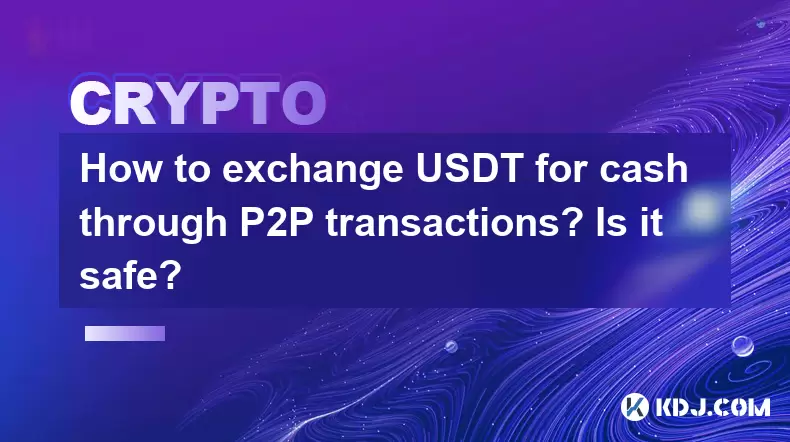
How to exchange USDT for cash through P2P transactions? Is it safe?
Jun 18,2025 at 07:56am
Understanding USDT and P2P TransactionsTether (USDT) is a stablecoin pegged to the value of the US dollar, making it a popular choice for users who wa...
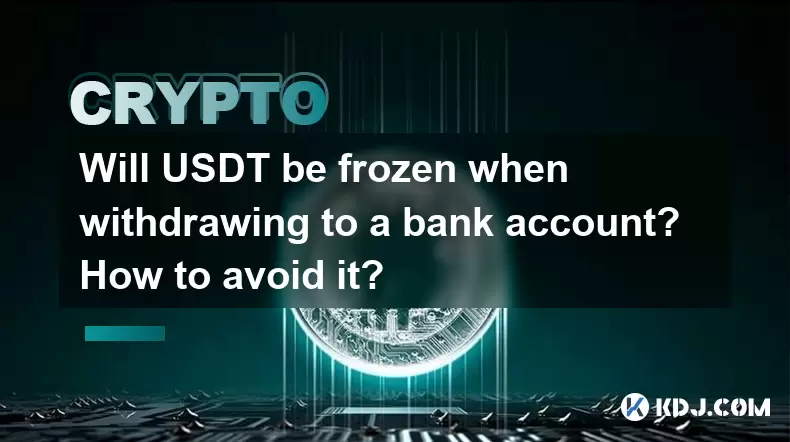
Will USDT be frozen when withdrawing to a bank account? How to avoid it?
Jun 15,2025 at 10:03am
Understanding USDT Withdrawals and Bank Account Freezing RisksWhen users decide to withdraw USDT (Tether) to a bank account, one of the most common co...
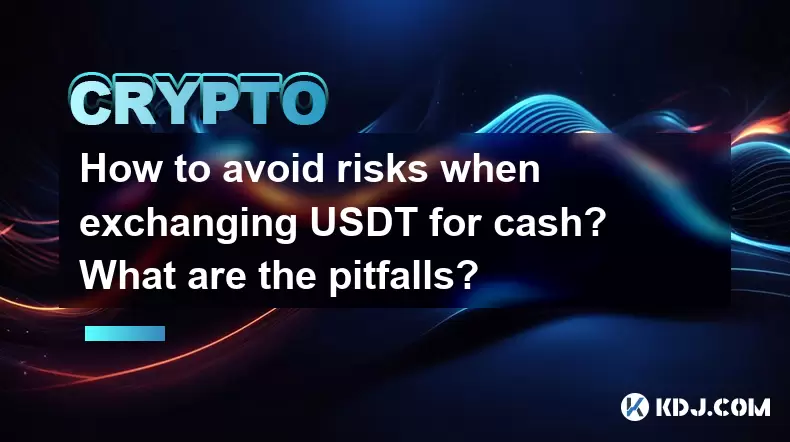
How to avoid risks when exchanging USDT for cash? What are the pitfalls?
Jun 11,2025 at 08:14pm
Understanding the Risks of Exchanging USDT for CashWhen exchanging USDT (Tether) for cash, users must be aware of the potential risks involved. As a s...

How to choose a reliable USDT exchange service provider? How to identify?
Jun 12,2025 at 03:15pm
Understanding the Role of USDT in Cryptocurrency TradingUSDT (Tether) is one of the most widely used stablecoins in the cryptocurrency market. It is d...

What is the most convenient way to cash out small amounts of USDT? Is there a shortcut?
Jun 11,2025 at 11:00pm
Understanding the Need to Cash Out Small USDT AmountsCashing out small amounts of USDT can be a challenge for many crypto users. Traditional methods o...

How to transfer USDT to PayPal or international payment tools?
Jun 15,2025 at 05:28am
Understanding the Basics of USDT and PayPal IntegrationUSDT (Tether) is a stablecoin pegged to the US dollar, offering blockchain-based value transfer...

How to exchange USDT for cash through P2P transactions? Is it safe?
Jun 18,2025 at 07:56am
Understanding USDT and P2P TransactionsTether (USDT) is a stablecoin pegged to the value of the US dollar, making it a popular choice for users who wa...

Will USDT be frozen when withdrawing to a bank account? How to avoid it?
Jun 15,2025 at 10:03am
Understanding USDT Withdrawals and Bank Account Freezing RisksWhen users decide to withdraw USDT (Tether) to a bank account, one of the most common co...

How to avoid risks when exchanging USDT for cash? What are the pitfalls?
Jun 11,2025 at 08:14pm
Understanding the Risks of Exchanging USDT for CashWhen exchanging USDT (Tether) for cash, users must be aware of the potential risks involved. As a s...
See all articles





















![Ultra Paracosm by IlIRuLaSIlI [3 coin] | Easy demon | Geometry dash Ultra Paracosm by IlIRuLaSIlI [3 coin] | Easy demon | Geometry dash](/uploads/2026/01/31/cryptocurrencies-news/videos/origin_697d592372464_image_500_375.webp)




















































